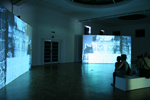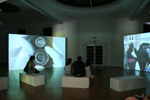The Perfect City’ is a single channel video work funded by Film London.
It was originally presented as a dual screen video installation for the exhibition 'The Perfect City'
PM Gallery, London, June 2007.12 minutes 50 seconds
from ‘Speaking with a Forked Tongue’by Rachel Garfield
“The Perfect City” embodies the chronicler through the narrator.
Benjamin describes the chronicler as the medieval precursor to the historian, who interpreted the world through ‘the divine plan of salvation’ unlike the historian who is striving for ‘accuracy’ and ‘explanation’. In the film, the narrator tells of his task of designing a city as a cautionary tale. The narrator is the artist, glimpsed in the opening shot. He builds, literally a city out of card, the card printed with medieval architectural illustrations, while he’s contemplating the implications of the city as a poetic device. Other visual references skip through time such as a Breugel painting of the Tower of Babel, contemporary commercial skyscrapers, digital architectural drawings. The earlier installations of ‘Ship Called Jesus’ and the ‘Exploded City’ are both reworked here to powerful effect, although this film is more compact than the former and more filmic than the latter. The form is essayistic and the collage has given way to montage where the viewer experiences the unfolding of thoughts through the imagery, sound and narration. It is slower in pace than many of his other pieces, if as dense. Divided into 5 days, or chapters of themes of the city as a holder of memories - of drowning; of contamination; of amputation; of cleansing and of burning. Despite the evocation of memory this is a nostalgia free zone. The sound and image are more like science fiction than psycho geography. The narrator, if anything, is doom laden, a Jeremiah, the voice of god, imagining a future by looking through the past: a further example of the way in which Piper draws deep for a commentary on the contemporary. Blackness here is naturalized through reference without foregrounding specificity and the subject is the Subject of Power.
‘A Ship Called Jesus’ was an installation that explored the relationship between the Black community in Britain, slavery and Christianity, positing the Old Testament as a force for identification both in activism and in conservatism. In the ‘Perfect City’ the bible is a cipher for the city as the symbol of the exertion of Western Modern power over its subjects. It is also an acknowledgment of Christianity as the cornerstone of Western ideology in the contemporary world or at least of the triumph of Christian ideology in a US dominated post 9/11 world. This is a film of paradox that both confirms and confounds the god-like narration. In the final chapter, ‘Day Five: The Memory of Burning’ the overriding thesis is revealed through a reference by the narrator to two angels sent to Sodom and Gomorrah to search for ten pious men because the city contains a fatal flaw in its tendency towards chaos1. The two angels are represented by medieval illustrations; two B29’s diving over Hiroshima and Nagasaki and the narrator flicking through photos of scarred and burned victims of war, the narrator ponders, “I wonder for Gods fondness for the purifying flame?”. Clarity is brought at the end of the film - the US is referred to as “The nation of control’, while in front of the burning card city, a photo of the twin towers of the World Trade Centre is held aloft by the gloved hands of the narrator, also a metaphor or the twin angels, no doubt. “No more water, fire next time”.
The voice of Keith Piper’s films are distinctive: judging the system and finding it wanting. We have come to expect a neo minimal trope from work that operates through a transnational critique, but in this respect amongst others Piper stands out, against the grain, with his singular voice that continues to offer complexity and agency in the face of the injustices of history. Amid the cacophony of neo liberal critique of the status quo it is unusual to find so strident a voice. And it is the voice that remains long after the complex overlay of imagery has left the screens.
1 This is somewhat reminiscent of Zygmunt Bauman’s analysis of the Modernity being an ideology of order and anti-Semitism a cipher for the anxiety of the lack of order that Jews represent by being international - the weeds in the tidy garden of modernity.
 |
 |
|
|---|---|---|
 |
 |
|
Download 'The Perfect City' Pdf |
||